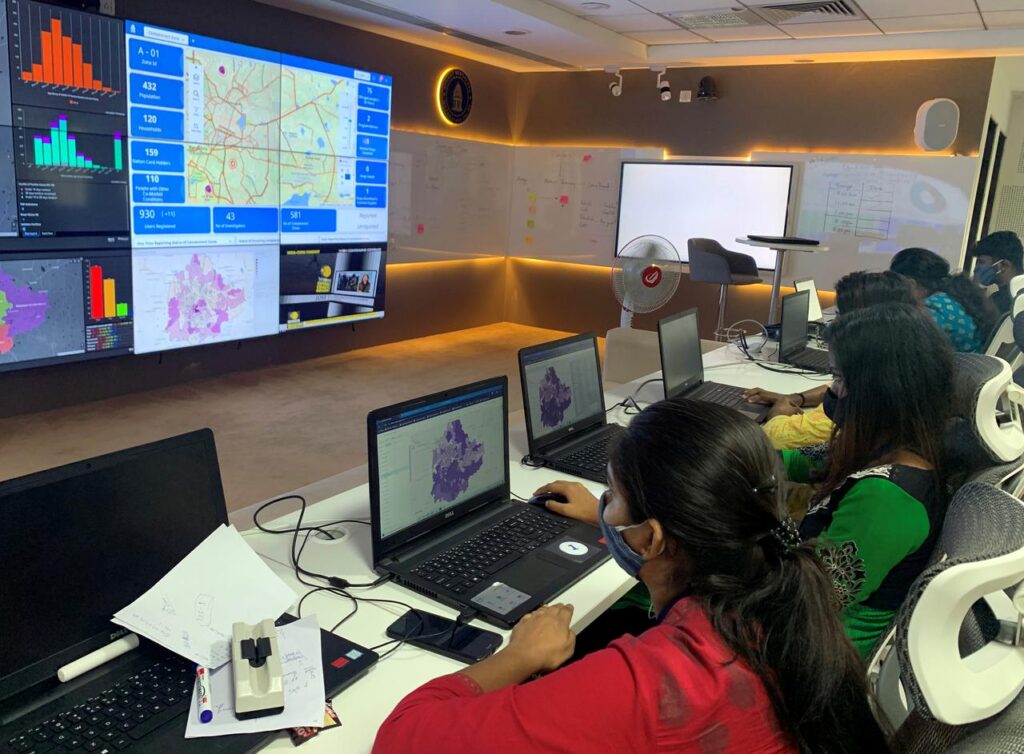How Bengaluru Saw Its COVID-19 Success Come Undone
Aug 26, 2020 | Pratirodh Bureau
FILE PHOTO: Software professionals assisting municipal authorities work on their terminals inside a "war room" focused on tracking the spread of the coronavirus disease at the Bruhat Bengaluru Mahanagara Palike office in Bengaluru on July 2, 2020
On June 9, Karnataka’s Health Education Minister posted an infographic on Twitter showing COVID-19 infections and deaths in the city of Bengaluru were running about half the rate in New Zealand, a country acclaimed globally for reining in the disease.
The city — which has more than double the population of New Zealand — “stumps the Kiwis,” said the caption to the image posted by Sudhakar K., who is responsible for medical education in Karnataka. Bengaluru, known to many as Bangalore, is the capital of the state.
His tweet was liked and retweeted by thousands. But the celebration was short-lived.
At the time, only about 450 cases of the novel coronavirus had been recorded among Bengaluru’s population of more than 12.5 million, compared with more than 260,000 cases across India and about 1,150 in New Zealand.
Thanks partly to a high-tech testing and tracing system monitored by masked officials on giant screens in a city “war room,” Bengaluru had contained the outbreak better than cities like Mumbai, which had tallied more than 100 times as many cases.
Two and a half months on, Bengaluru, dubbed India’s Silicon Valley for its tech firms and startups, has reported more than 110,000 cases. Where its infections in early June rose by 25 a day on average, the rate is now more than 2,500. In New Zealand, the total caseload stood at 1,339 as of Aug. 25.
Sudhakar did not respond to requests for comment, but his tweet remains online.
Bengaluru’s early response was lauded by India’s government as a model, for its use of health surveys combined with efforts to tap tech expertise and cutting-edge software to analyse the spread of the disease.
But after India eased a nationwide lockdown in early June, epidemiologists and government officials involved in the city’s response to the pandemic said they realised they had not planned enough.
The experience illustrates the extent of the challenge faced by large cities across the globe, showing how rapidly an outbreak can snowball out of control.
“The city had three to four months to plan for a surge in cases, but the city did not plan for the future. They mostly assumed that the lockdown implementation was sufficient,” said Giridhara Babu, an epidemiologist advising the state of Karnataka.
CURFEW AND CONTACT-TRACE
In late March, India enforced one of the world’s strictest lockdowns. Karnataka state was ahead of that with its own measures.
It collaborated with software lobby NASSCOM to mobilise 150 employees from half a dozen IT firms to feed 20,000 international traveller records into a central system every day. Karnataka conducted a mammoth health survey. More than 40,000 government health workers roamed the state in pink uniforms and masks, surveying nearly 16 million households.
Residents submitted to a curfew that emptied parks, malls and the city’s notoriously clogged roads, and officials tapped companies such as Intel, Alphabet’s Google and Mumbai-based Fractal Analytics for expertise and tools to help trace, predict and control the spread.
Many surrendered personal information: At thousands of drugstores, officials collected contact details for people who bought drugs like paracetamol, to keep tabs on their health.
A federal government study shows Karnataka on average tested 47.4 contacts of every COVID-19-infected person between Jan. 22 and April 30, compared with the national average of six.
“THAT MANY PEOPLE”
But in June, lockdown restrictions eased. People flooded back to markets that sell fresh produce and flowers.
Besides locals, officials say tens of thousands of travellers streamed in from Maharashtra and Tamil Nadu, many unwittingly bringing the virus. The neighbouring states have been the two worst hit by COVID-19 in India.
“We were sandwiched between these two states which already had a very high viral load … so we were bound to get affected,” said Pankaj Pandey, the Health Commissioner for Karnataka.
An estimated 45,000 people from Maharashtra and another 20,000 from Tamil Nadu’s capital, Chennai, streamed into Bengaluru in June, he added.
“In the initial phase, the case numbers in Bangalore were so few, that people all over the country felt Bangalore is the safest. That may also have caused people to ‘reverse-migrate’ back to Bangalore,” said one official involved in Bengaluru’s response.
“We didn’t look at the inbound travellers as a major source of infections,” the official said. “We never anticipated that many people would come.”
Officials from Bengaluru’s municipal body, the Bruhat Bengaluru Mahanagara Palike (BBMP), did not respond to queries on whether it failed to address gaps in its modelling systems.
But Hephsiba Rani Korlapati, a bureaucrat running the Bengaluru “war room” said easing lockdown complicated the city’s efforts.
Since late June, Bengaluru has been sealing areas where cases jump, said Korlapati, noting this involves placing barricades at entry and exit points – in effect quarantining entire neighbourhoods.
“Aggressive testing of contacts and home isolation is the way to contain the spread,” she said. “That is being taken very seriously and is being done right now.”
